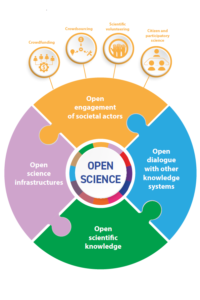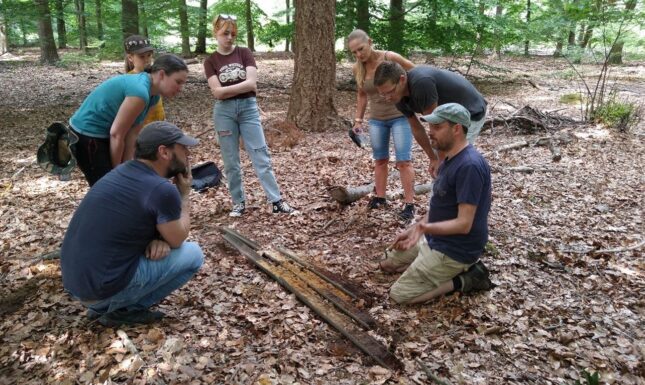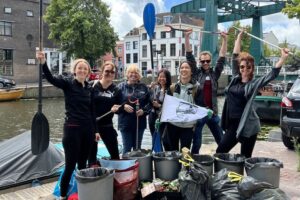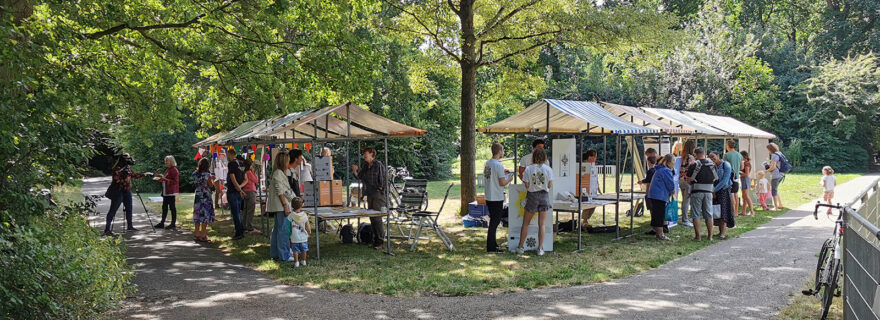Citizen Science in the CWTS Knowledge Agenda
Participatory practices such as Citizen Science are key to achieving the open engagement of societal actors in research, one of the core pillars of Open Science. In this blog post, the coordinator of the Citizen Science Lab introduces the vision for Citizen Science in the CWTS Knowledge Agenda.
Throughout a recent series of blog posts, we have been introducing the CWTS knowledge agenda for 2023-2028, which is divided into three new focal areas to organise our activities on specific themes. Within each of these focal areas, we are investigating and challenging the way science is practised and governed, and how society is engaged and included in the science ecosystem, with the aim of actively contributing to a stronger and healthier research system. One of these is the Engagement and Inclusion Focal Area, which aims to contribute to a more collaborative, engaged, and inclusive research system.

Opening the research and innovation system to the participation of societal actors is one of the central pillars of the UNESCO Recommendations on Open Science. This not only relates to the ethos that scientific knowledge is a common good that all people have the right to benefit from but also relates to the more urgent need to facilitate the participation of actors across society towards jointly tackling the challenges facing us as a society, from climate change to global health pandemics. These issues require the inclusion of diverse perspectives and insights, as well as co-ownership and action from all stakeholders. Citizen Science and other participatory practices make a meaningful contribution towards both these aims.
Citizen Science in the Research Landscape
The field of Citizen Science has been making great advances over the past decade, involving increasing numbers of citizens in monitoring, observing, and co-researching societal issues such as climate change impacts on the environment and public health, and human impacts on our living environment and nature. Such initiatives have been achieving important outcomes from fundamental scientific discoveries, to aggregated data that support evidence-informed policy. The longer-term impacts from participating in such collaborative research can include community co-ownership of urgent issues, increased science literacy and learning, and the empowerment of individual and collective action towards addressing these issues.
A wide range of practices fall under the umbrella term ‘Citizen Science’, but the common factor is the genuine participation of members of society outside academia in any stage of the research processes towards producing new knowledge or other science outcomes - from citizens & community groups to civil society organisations & non-governmental organisations - across virtually all scientific disciplines.

For example, in the category of ‘new discoveries’, the Leiden University-led Heritage Quest project engaged volunteers in archaeological research on their home computers by inviting them to identify and mark archaeological features such as burial mounds that would otherwise be hidden by vegetation, in high-resolution LiDAR images. Volunteers were then invited to join archaeologists in the field in the Veluwe and surrounding area to verify the findings, resulting in the discovery of 80 new burial mounds, 36 km2 of prehistoric fields, approximately 900 charcoal pits, and numerous examples of ancient cart tracks - leading to a new understanding of the settlement history of the region.

More locally in the category of ‘policy impact’, the Grachtwacht initiative led by PhD candidates Liselotte Rambonnet and Auke-Florian Heemstra has been cleaning the canals of Leiden with over 600 volunteers in canoes removing, sorting, and assessing macro litter in the urban waterways since 2018 - leading to deeper insights into the types and sources of urban litter, and policy actions for tackling these at the source based on data-driven policy recommendations and reports.
At the European level, the European Commission (EC) views citizen engagement practices as essential to achieving the strategic aims of the European Green Deal. They are woven throughout the funding instruments of Horizon Europe, including the European clusters and Missions, and the New European Bauhaus. Citizen Science is also being embedded by the EU Member States in their national science policies to involve stakeholders across the quadruple helix in Research & Innovation (R&I) - as can be seen in the Dutch National Programme Open Science (NPOS) 2030 Ambition, and the NWO Open Science NL work programme for 2024-2025.
The ‘Science of Citizen Science’
The Citizen Science Lab at Leiden University is helping to mainstream participatory research practices in all domains by functioning as a knowledge hub for Citizen Science within the Open Science Programme, and as a project incubator partnering with researchers, policy-makers, and societal stakeholders to collaboratively address urgent and societally-relevant issues.
Within CWTS, the Citizen Science Lab functions as a research centre for the 'Science of Citizen Science’, investigating for example the ‘added value’ of participatory research practices on the quality of research and its outcomes, and evaluating and monitoring the range of impacts and outcomes of participatory methods.
Citizen Science in the CWTS Knowledge Agenda
At the heart of the new CWTS Knowledge Agenda is the consideration of how research evaluation in its many forms impacts research agenda-setting, notions of quality, and daily practices of research and scholarly communication; how meaningful public engagement in research processes impact the value and relevance of academic research; how academia and academic career pathways can become more inclusive and diverse; and how structural inequities and lack of diversity and inclusion in global science can be addressed.
The Citizen Science Lab will contribute to tackling these and other questions regarding the engagement of societal actors in knowledge production in the activities of the Engagement and Inclusion focal area and regarding the impact and evaluation of these practices in the activities of the Evaluation and Culture focal area.
If you are interested in finding out more about Citizen Science and joining us on this journey, please contact Citizen Science Lab coordinator Margaret Gold.
Citizen Science at Leiden UniversityAt Leiden University, we see Open Science as a crucial way to make a greater scientific and societal impact, and we actively seek new ways of recognising and rewarding our employees for putting open science, collaboration, well-being, and leadership at the heart of our work. The Academia in Motion (AiM) programme aims to make Leiden University a more open workplace that recognises and rewards all contributions, and an institution that creates and shares knowledge more freely with society. One focus of the Academia in Motion programme is the integration of Citizen Science and other societal engagement practices across all research and education at the university, embedded within the Open Science Programme. A core goal is to raise awareness about the value and impacts of various participatory practices, which is partly achieved via the ‘Citizen Science at Leiden University Teams community. Both the Open Science Community Leiden (OSCL) and the Citizen Science Lab offer opportunities to get started with Citizen Science and other participatory practices: OSCL hosts workshops, talks, and walk-in hours on many Open Science topics, including Citizen Science. Anyone is welcome to join the OSCL community. Information about upcoming events can be found on the OSCL Teams channel. The Citizen Science Lab can offer made-to-order workshops, training, and seminars on participatory research practices in any field of research or teaching, and can be turned to for support and advice on applying these practices in your own work. Get in touch with coordinator Margaret Gold, or join the Citizen Science at Leiden University Teams community, to find out more about upcoming events, ask questions, and share your own experiences with others. You can also access the growing repository of resources in the CS & UL Teams Wiki. Follow the Citizen Science lab on LinkedIn and Mastodon. |
Header image from Friso de Hartog
UNESCO OS Recommendations. Source: UNESCO
Volunteers set to work for Heritage Quest. Source: Universiteit Leiden
Volunteers joining the weekly Canal clean-ups. Source: De Grachtwacht
DOI: 10.59350/z2mgz-fq313



0 Comments
Add a comment